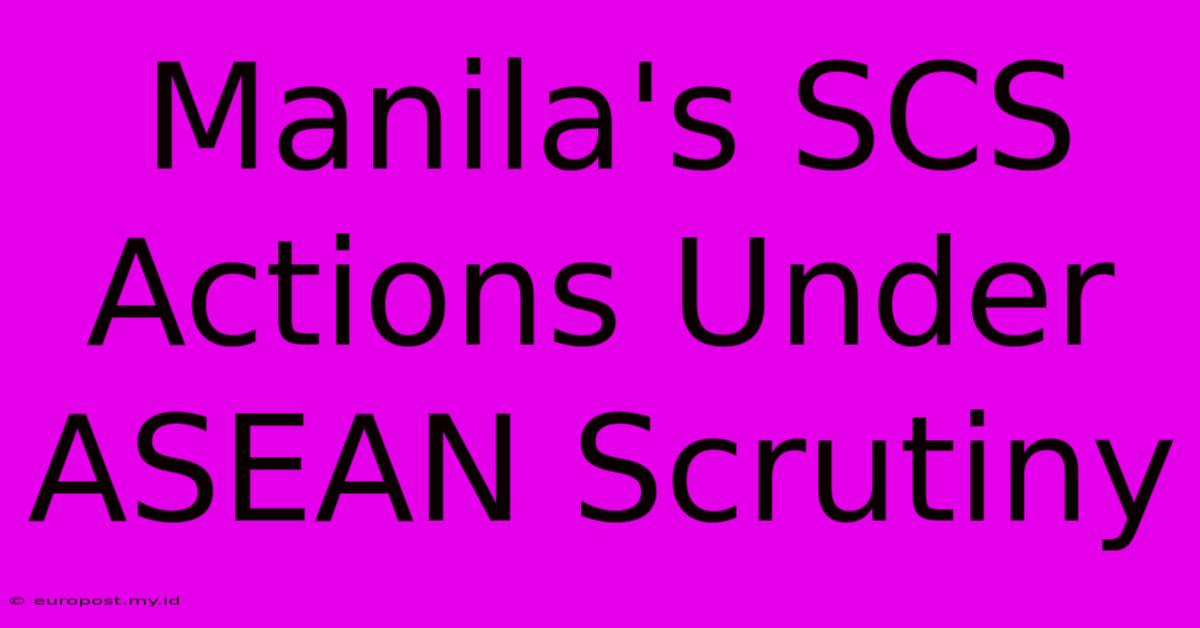Manila's SCS Actions Under ASEAN Scrutiny

Discover more in-depth information on our site. Click the link below to dive deeper: Visit the Best Website meltwatermedia.ca. Make sure you don’t miss it!
Table of Contents
Manila's SCS Actions Under ASEAN Scrutiny: Navigating a Complex Geopolitical Landscape
The South China Sea (SCS) remains a focal point of geopolitical tension, with Manila's actions within this contested waterway consistently drawing scrutiny from fellow members of the Association of Southeast Asian Nations (ASEAN). Understanding the intricacies of this relationship requires examining the Philippines' approach to SCS disputes, the perspectives of other ASEAN nations, and the broader implications for regional stability.
The Philippines' Stance: Balancing Sovereignty and Diplomacy
The Philippines has long asserted its sovereign rights over areas within the SCS, based on the 1982 United Nations Convention on the Law of the Sea (UNCLOS). This assertion, however, is frequently challenged by China's expansive claims encompassing much of the sea. Manila's approach has been characterized by a delicate balancing act:
Assertion of Rights:
- Legal Challenges: The Philippines has successfully utilized international legal mechanisms, notably winning its case against China before the Permanent Court of Arbitration in 2016. This landmark ruling, while legally binding on China, has not fully resolved the territorial disputes.
- Military Modernization: The Philippines has embarked on a significant military modernization program, aiming to bolster its capabilities to defend its claimed territories in the SCS. This includes investments in naval vessels, aircraft, and coastal defense systems.
- Enhanced Cooperation with Allies: Strengthened partnerships with the United States, Japan, Australia, and other like-minded countries provide crucial support in terms of security cooperation, intelligence sharing, and joint military exercises in the region.
Diplomatic Engagement:
- ASEAN Framework: The Philippines actively participates in ASEAN mechanisms for addressing SCS disputes, often advocating for a rules-based order and peaceful resolution through dialogue. However, the limitations of ASEAN's consensus-based approach have often hampered decisive action against China's assertive actions.
- Bilateral Talks: Manila continues to engage in bilateral talks with China, aiming to manage disagreements and explore areas of cooperation. While these dialogues offer avenues for communication, they haven't always yielded significant progress in resolving core territorial disputes.
ASEAN's Diverse Perspectives and Concerns
ASEAN's response to Manila's SCS actions, and China's broader activities, is multifaceted. While many members share concerns about China's assertive behavior, their responses vary depending on individual national interests and relationships with Beijing.
Concerns Shared by Many ASEAN Members:
- Freedom of Navigation: The majority of ASEAN states are concerned about China's actions that potentially restrict freedom of navigation and overflight in the SCS, impacting trade and regional security.
- Environmental Degradation: Unilateral actions by China, such as extensive island building and fishing practices, raise serious concerns about environmental damage within the ecologically sensitive SCS.
- Regional Stability: The escalating tensions in the SCS pose a direct threat to regional peace and stability, impacting ASEAN's overarching goal of promoting a peaceful and prosperous Southeast Asia.
Differing Approaches:
Some ASEAN members maintain closer economic and political ties with China, leading to a more cautious approach towards openly criticizing Beijing's actions in the SCS. Others prioritize upholding the rule of law and a rules-based international order, even if it means risking strained relations with China. This divergence in approach often makes it challenging for ASEAN to formulate a unified response to China's actions.
Navigating the Future: Challenges and Opportunities
Manila's actions in the SCS, and the broader ASEAN response, will continue to shape the geopolitical landscape of the region for years to come. Several key challenges and opportunities lie ahead:
- Maintaining a Balance: The Philippines faces the ongoing challenge of balancing its sovereign rights claims with the need for diplomatic engagement and regional stability.
- Strengthening ASEAN Unity: A more unified ASEAN approach towards the SCS disputes is crucial for effective pressure on China to abide by international law. However, bridging the existing divisions amongst members will require considerable diplomatic effort.
- Leveraging International Support: Continued cooperation with external partners like the US, Japan, and Australia is essential for enhancing the Philippines' capabilities to defend its interests and for deterring aggressive actions by China.
- Exploring Pathways for Cooperation: Despite the existing tensions, opportunities exist for cooperation in areas like maritime security, resource management, and environmental protection in the SCS. Building upon these areas of potential collaboration could contribute to de-escalating tensions and foster a more stable environment.
The situation in the SCS remains dynamic and complex. The Philippines' strategic maneuvering, under the watchful eye of ASEAN, will continue to be a critical factor in shaping the future of this strategically important region. The international community's continued engagement and support for a rules-based order will be crucial in fostering peaceful resolution and preventing further escalation of tensions.

Thank you for taking the time to explore our website Manila's SCS Actions Under ASEAN Scrutiny. We hope you find the information useful. Feel free to contact us for any questions, and don’t forget to bookmark us for future visits!
We truly appreciate your visit to explore more about Manila's SCS Actions Under ASEAN Scrutiny. Let us know if you need further assistance. Be sure to bookmark this site and visit us again soon!
Featured Posts
-
Ufc 309 Uk Start Time Fight Card Viewing
Nov 16, 2024
-
Nayanthara Accuses Producer Of Emperor Behavior
Nov 16, 2024
-
Sustainable Finance For Global Green Growth
Nov 16, 2024
-
Rafting Tragedy Police Interview Nineteen
Nov 16, 2024
-
Ufc 309 Uk Date Time Fight Card Live Stream
Nov 16, 2024
